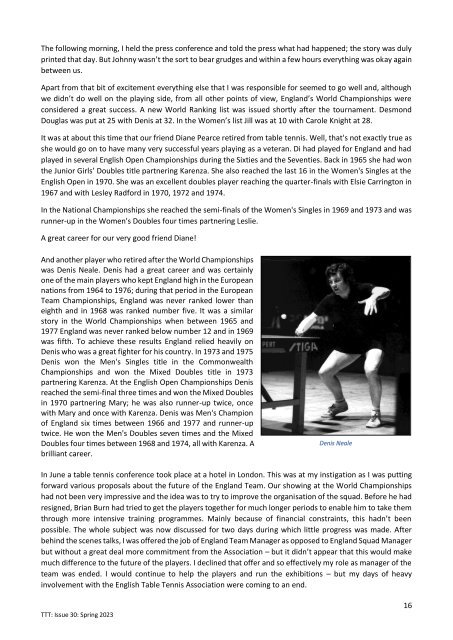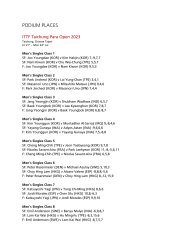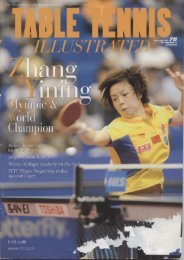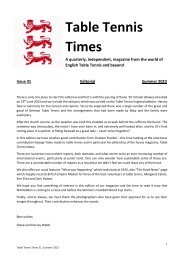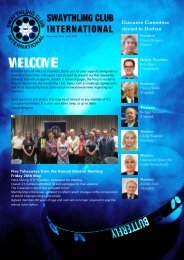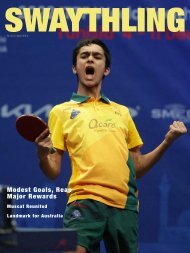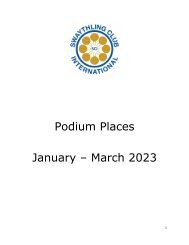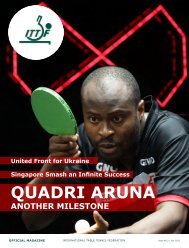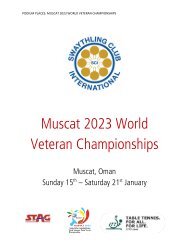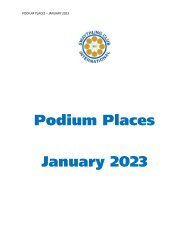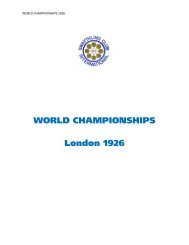TTT30 Spring 2023
You also want an ePaper? Increase the reach of your titles
YUMPU automatically turns print PDFs into web optimized ePapers that Google loves.
The following morning, I held the press conference and told the press what had happened; the story was duly<br />
printed that day. But Johnny wasn’t the sort to bear grudges and within a few hours everything was okay again<br />
between us.<br />
Apart from that bit of excitement everything else that I was responsible for seemed to go well and, although<br />
we didn’t do well on the playing side, from all other points of view, England’s World Championships were<br />
considered a great success. A new World Ranking list was issued shortly after the tournament. Desmond<br />
Douglas was put at 25 with Denis at 32. In the Women’s list Jill was at 10 with Carole Knight at 28.<br />
It was at about this time that our friend Diane Pearce retired from table tennis. Well, that's not exactly true as<br />
she would go on to have many very successful years playing as a veteran. Di had played for England and had<br />
played in several English Open Championships during the Sixties and the Seventies. Back in 1965 she had won<br />
the Junior Girls’ Doubles title partnering Karenza. She also reached the last 16 in the Women's Singles at the<br />
English Open in 1970. She was an excellent doubles player reaching the quarter-finals with Elsie Carrington in<br />
1967 and with Lesley Radford in 1970, 1972 and 1974.<br />
In the National Championships she reached the semi-finals of the Women's Singles in 1969 and 1973 and was<br />
runner-up in the Women's Doubles four times partnering Leslie.<br />
A great career for our very good friend Diane!<br />
And another player who retired after the World Championships<br />
was Denis Neale. Denis had a great career and was certainly<br />
one of the main players who kept England high in the European<br />
nations from 1964 to 1976; during that period in the European<br />
Team Championships, England was never ranked lower than<br />
eighth and in 1968 was ranked number five. It was a similar<br />
story in the World Championships when between 1965 and<br />
1977 England was never ranked below number 12 and in 1969<br />
was fifth. To achieve these results England relied heavily on<br />
Denis who was a great fighter for his country. In 1973 and 1975<br />
Denis won the Men's Singles title in the Commonwealth<br />
Championships and won the Mixed Doubles title in 1973<br />
partnering Karenza. At the English Open Championships Denis<br />
reached the semi-final three times and won the Mixed Doubles<br />
in 1970 partnering Mary; he was also runner-up twice, once<br />
with Mary and once with Karenza. Denis was Men's Champion<br />
of England six times between 1966 and 1977 and runner-up<br />
twice. He won the Men's Doubles seven times and the Mixed<br />
Doubles four times between 1968 and 1974, all with Karenza. A<br />
brilliant career.<br />
Denis Neale<br />
In June a table tennis conference took place at a hotel in London. This was at my instigation as I was putting<br />
forward various proposals about the future of the England Team. Our showing at the World Championships<br />
had not been very impressive and the idea was to try to improve the organisation of the squad. Before he had<br />
resigned, Brian Burn had tried to get the players together for much longer periods to enable him to take them<br />
through more intensive training programmes. Mainly because of financial constraints, this hadn’t been<br />
possible. The whole subject was now discussed for two days during which little progress was made. After<br />
behind the scenes talks, I was offered the job of England Team Manager as opposed to England Squad Manager<br />
but without a great deal more commitment from the Association – but it didn’t appear that this would make<br />
much difference to the future of the players. I declined that offer and so effectively my role as manager of the<br />
team was ended. I would continue to help the players and run the exhibitions – but my days of heavy<br />
involvement with the English Table Tennis Association were coming to an end.<br />
TTT: Issue 30: <strong>Spring</strong> <strong>2023</strong><br />
16


